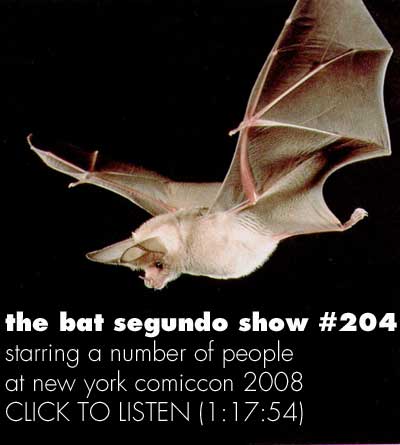Peter David appeared on The Bat Segundo Show #225. He is most recently the author of Tigerheart and the Incredible Hulk novelization.
Condition of the Show: Investigating claimed nemeses of Goliath.
Author: Peter David
Subjects Discussed: On being prolific, producing work quickly, writing stories set in expansive universe, reacting to a universal construct, working with mythos, the Fallen Angel universe, the Star Trek: New Frontier books, Joseph Campbell and Star Wars, Willow, fundamental tropes in storytelling, whether or not all stories are derivative, retinkering the Peter Pan formula for Tigerheart, the advantages of pastiche, James Barrie, Don Quixote, the Great Ormond Street Childrens Hospital’s litigious actions towards Peter Pan adaptations, emulating Barrie’s voice, the unproducable nature of Barrie’s Peter Pan play, the advantages of dream narratives, the conversational nature of the comic book script medium, cameo appearances and throwaway side characters in Tigerheart, verisimilitude, managing numerous characters in a universe, story elements that originate from the protagonist, speculative double entendres to George Bush, adjusting comic storylines as sales figures come in, spicing things up in Fallen Angel, keeping a comic book marketable and other commercial demands, David’s twelve-year run on the Hulk, boosting sales, the role of the comic book editor, David’s exclusive Marvel contract, Tennessee Williams, unique stories and salable stories, and coordinating storylines on other comic books.
EXCERPT FROM SHOW:
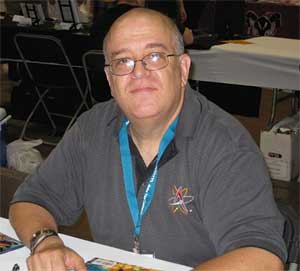 Correspondent: I’m wondering though if there has ever been an instance in your comic career, in which an editor has come to you and said, “Hey, Peter, the sales for this particular title are flagging. What can we do to raise things up?” Has this ever an influence?
Correspondent: I’m wondering though if there has ever been an instance in your comic career, in which an editor has come to you and said, “Hey, Peter, the sales for this particular title are flagging. What can we do to raise things up?” Has this ever an influence?
David: Sure. Of course it’s an influence. I mean, look, when it comes to — particularly my work-for-hire material — my job at the end of the day is to do two things. As far as the publisher is concerned. This is purely my job as far as the publisher is concerned, okay? Number one: Turn in a publishable script. And number two: Do everything that is within my power to write a book that will sell. Okay? Because I could turn in absolutely kickass scripts that aren’t going to sell for crap. But I feel to a certain degree that part of my job is to try and do everything I can to keep the book marketable. I’ve been doing that my entire comic book career. When I was writing Hulk, during my initial twelve-year run, I regularly had access to sales figures ahead of time. Three, four months ahead of time. Because that’s how far ahead we were soliciting. And they were incredibly instructional. Because what would happen is, I would be aware of a sales drop months ahead of time. Months ahead of time. So that I would have the Hulk in a particular incarnation going through a particular series of events. If I saw sales starting to flag, I’d say to myself, “Okay. That incarnation of the Hulk seems to be running its course. Time to come up with something else.”
So if you want to have an idea of when sales were starting to drop during my twelve-year run, at any particular time, look to a point where the Hulk undergoes some kind of transformation, backdate yourself about six months and that’s when I was looking at the sales figures, going, “Okay. We have a drop.” The problem nowadays is that we don’t know sales figures until after the book is already on the stands. So instead of having a three to four month early warning system, so that I can course correct ahead of time, we are always behind the curve by three to four months. Because we don’t know the sales numbers until at least two months after the book has come out. I mean, you know, we see the sales numbers on ICv2 or whatever it is. That’s when I see the sales numbers. We see those sales numbers come out two to three months after the book is on the stands, plus we’re soliciting three months down the line. So you can find yourself in free-fall before you’re aware of the fact that you’ve got any kind of attrition problem. Because every book’s always going to have attrition. Every book. Every book. There’s no stopping it. There’s always going to be. You’re going to get a build. And then it’s going to level off. And then it’s going to start to drop. Always. No matter what the book is. Always. The thing I was able to do on Hulk is, when I saw it start to drop, I would say, “Okay. Time to do something different.” And I could come up with a new angle on The Hulk that would boost sales. Because we’d have people going, “Oh, they’re doing something new and different with The Hulk? Let’s see.” As it is, I can’t course correct. And it’s incredibly frustrating.
Correspondent: But I’m also wondering if some of the stuff that you do with, say, Fallen Angel — I mean, you had a post on your blog recently in which a gentleman couldn’t purchase it from his neighborhood comic store. Because he was the only person purchasing the issue.
David: Buying it, yeah.
Correspondent: So for something like this, is Fallen Angel more of an unfettered territory to write in?
David: It’s unfettered territory. But that doesn’t mean that I don’t want to see sales be brought up.
Download BSS #225: Peter David (MP3)
Listen: Play in new window | Download


 Correspondent: Here we have a military strip. But there’s no reference to Iraq. And I wanted to ask you about this kind of balance.
Correspondent: Here we have a military strip. But there’s no reference to Iraq. And I wanted to ask you about this kind of balance. 
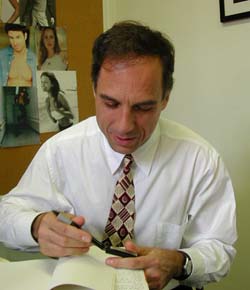 Correspondent: I’m wondering if certain artists may have changed their names because the comic book industry was considered a great calumny for many of these various artists and writers. Did you face a problem along those lines in tracking people down?
Correspondent: I’m wondering if certain artists may have changed their names because the comic book industry was considered a great calumny for many of these various artists and writers. Did you face a problem along those lines in tracking people down?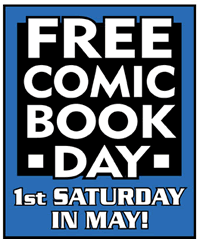
 I walked into my local comic shop and saw few unfamiliar faces looking over a few freebies. I walked out with a thick stack of comic books, headed home, and consumed them in the best way: in one mad tear, one mad comic book binge.
I walked into my local comic shop and saw few unfamiliar faces looking over a few freebies. I walked out with a thick stack of comic books, headed home, and consumed them in the best way: in one mad tear, one mad comic book binge.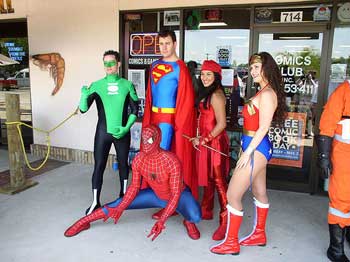 A free book along those lines wasn’t in my thick stack. And I doubt that many people who were in a comic shop for the first time will visit again and leave with an altogether different stack that contains a receipt. Reading an FCBD comic is like talking to the friend who tells you that he has an amazing story, but he doesn’t have the time to tell it to you right now. There were people in the stores, and FCBD deserves credit for this. But all these people ever got was a tease.
A free book along those lines wasn’t in my thick stack. And I doubt that many people who were in a comic shop for the first time will visit again and leave with an altogether different stack that contains a receipt. Reading an FCBD comic is like talking to the friend who tells you that he has an amazing story, but he doesn’t have the time to tell it to you right now. There were people in the stores, and FCBD deserves credit for this. But all these people ever got was a tease.